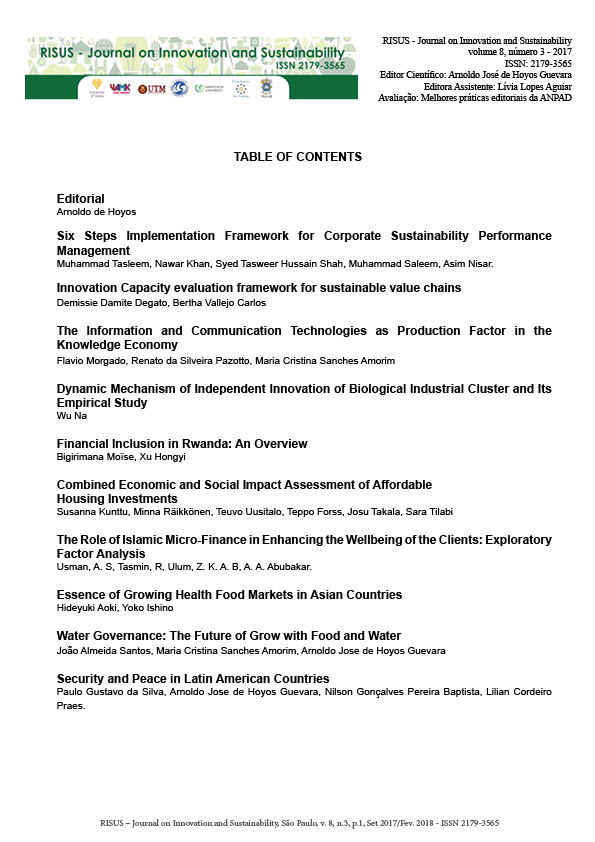INNOVATION CAPACITY EVALUATION FRAMEWORK FOR SUSTAINABLE VALUE CHAINS
DOI:
https://doi.org/10.24212/2179-3565.2017v8i3p16-50Palabras clave:
Innovation capacity, sustainable value chain, fuzzy qualitative comparative analysisResumen
Innovation is highly demanded for achieving competitiveness and sustainability in value chains. However, few empirical studies have been conducted to identify causal conditions and measurements of innovation capacity in value chains, particularly in developing countries. Combing concepts and methods from value chain upgrading, technological capability and sustainability-oriented innovation system literature, this study aims at identifying a condition or combination of conditions for promoting innovation capacity for inclusive sustainable value chains. It then empirically analyzes the necessary conditions and identifies multiple paths for developing innovation capacity by taking up the cases of two local and two globally linked value chains from Ethiopia. The study also develops a comprehensive innovation capacity evaluation model by combining different capability building strategies and learning mechanisms, and applies a comprehensive fuzzy evaluation method for measuring the level of innovation capacity of the four value chains. The study identifies eight main dimensions of innovation capacity for sustainable value chains, which are categorized into four groups in order to identify necessary and sufficient conditions. The study finds that the simultaneous presence of technological upgrading, value chain restructuring and green governance reforms is sufficient conditions for the development of innovation capacity. We also find that public-private partnership (innovation platform) is necessary condition for achieving outstanding value chain innovation capacity. By developing and applying a fuzzy comprehensive evaluation model for measuring value chain innovation capacity and fuzzy set qualitative comparative analysis for identifying necessary and sufficient conditions for innovation capacity development in a sustainable value chain, the study makes an important methodological contribution to existing literature. It also provides relevant insight for policy makers and practitioners in designing strategies and policy instruments for achieving a high degree of innovation capacity.Descargas
Publicado
2017-09-01
Número
Sección
Papers
Licencia
This Journal is licensed under a Creative Commons Attribution-Non Commercial-No Derivers 4.0 International license.
1.The author (s) authorize the publication of the article in the journal;
2.The author (s) warrant that the contribution is original and unpublished and is not in the process of being evaluated in other journal (s);
3. The journal is not responsible for the opinions, ideas and concepts emitted in the texts, as they are the sole responsibility of its author (s);
4. The editors are entitled to make textual adjustments and to adapt the articles to the standards of publication.


